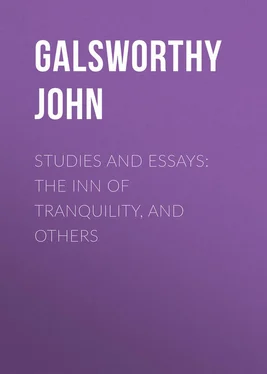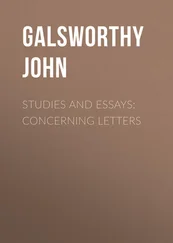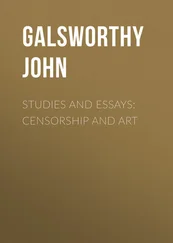John Galsworthy - Studies and Essays - The Inn of Tranquility, and Others
Здесь есть возможность читать онлайн «John Galsworthy - Studies and Essays - The Inn of Tranquility, and Others» — ознакомительный отрывок электронной книги совершенно бесплатно, а после прочтения отрывка купить полную версию. В некоторых случаях можно слушать аудио, скачать через торрент в формате fb2 и присутствует краткое содержание. Жанр: foreign_antique, foreign_prose, на английском языке. Описание произведения, (предисловие) а так же отзывы посетителей доступны на портале библиотеки ЛибКат.
- Название:Studies and Essays: The Inn of Tranquility, and Others
- Автор:
- Жанр:
- Год:неизвестен
- ISBN:нет данных
- Рейтинг книги:4 / 5. Голосов: 1
-
Избранное:Добавить в избранное
- Отзывы:
-
Ваша оценка:
- 80
- 1
- 2
- 3
- 4
- 5
Studies and Essays: The Inn of Tranquility, and Others: краткое содержание, описание и аннотация
Предлагаем к чтению аннотацию, описание, краткое содержание или предисловие (зависит от того, что написал сам автор книги «Studies and Essays: The Inn of Tranquility, and Others»). Если вы не нашли необходимую информацию о книге — напишите в комментариях, мы постараемся отыскать её.
Studies and Essays: The Inn of Tranquility, and Others — читать онлайн ознакомительный отрывок
Ниже представлен текст книги, разбитый по страницам. Система сохранения места последней прочитанной страницы, позволяет с удобством читать онлайн бесплатно книгу «Studies and Essays: The Inn of Tranquility, and Others», без необходимости каждый раз заново искать на чём Вы остановились. Поставьте закладку, и сможете в любой момент перейти на страницу, на которой закончили чтение.
Интервал:
Закладка:
John Galsworthy
Studies and Essays: The Inn of Tranquility, and Others
"Je vous dirai que l'exces est toujours un mal."
– ANATOLE FRANCETHE INN OF TRANQUILLITY
Under a burning blue sky, among the pine-trees and junipers, the cypresses and olives of that Odyssean coast, we came one afternoon on a pink house bearing the legend: "Osteria di Tranquillita,"; and, partly because of the name, and partly because we did not expect to find a house at all in those goat-haunted groves above the waves, we tarried for contemplation. To the familiar simplicity of that Italian building there were not lacking signs of a certain spiritual change, for out of the olive-grove which grew to its very doors a skittle-alley had been formed, and two baby cypress-trees were cut into the effigies of a cock and hen. The song of a gramophone, too, was breaking forth into the air, as it were the presiding voice of a high and cosmopolitan mind. And, lost in admiration, we became conscious of the odour of a full-flavoured cigar. Yes – in the skittle-alley a gentleman was standing who wore a bowler hat, a bright brown suit, pink tie, and very yellow boots. His head was round, his cheeks fat and well-coloured, his lips red and full under a black moustache, and he was regarding us through very thick and half-closed eyelids.
Perceiving him to be the proprietor of the high and cosmopolitan mind, we accosted him.
"Good-day!" he replied: "I spik English. Been in Amurrica yes."
"You have a lovely place here."
Sweeping a glance over the skittle-alley, he sent forth a long puff of smoke; then, turning to my companion (of the politer sex) with the air of one who has made himself perfect master of a foreign tongue, he smiled, and spoke.
"Too-quiet!"
"Precisely; the name of your inn, perhaps, suggests – "
"I change all that – soon I call it Anglo-American hotel."
"Ah! yes; you are very up-to-date already."
He closed one eye and smiled.
Having passed a few more compliments, we saluted and walked on; and, coming presently to the edge of the cliff, lay down on the thyme and the crumbled leaf-dust. All the small singing birds had long been shot and eaten; there came to us no sound but that of the waves swimming in on a gentle south wind. The wanton creatures seemed stretching out white arms to the land, flying desperately from a sea of such stupendous serenity; and over their bare shoulders their hair floated back, pale in the sunshine. If the air was void of sound, it was full of scent – that delicious and enlivening perfume of mingled gum, and herbs, and sweet wood being burned somewhere a long way off; and a silky, golden warmth slanted on to us through the olives and umbrella pines. Large wine-red violets were growing near. On such a cliff might Theocritus have lain, spinning his songs; on that divine sea Odysseus should have passed. And we felt that presently the goat-god must put his head forth from behind a rock.
It seemed a little queer that our friend in the bowler hat should move and breathe within one short flight of a cuckoo from this home of Pan. One could not but at first feelingly remember the old Boer saying: "O God, what things man sees when he goes out without a gun!" But soon the infinite incongruity of this juxtaposition began to produce within one a curious eagerness, a sort of half-philosophical delight. It began to seem too good, almost too romantic, to be true. To think of the gramophone wedded to the thin sweet singing of the olive leaves in the evening wind; to remember the scent of his rank cigar marrying with this wild incense; to read that enchanted name, "Inn of Tranquillity," and hear the bland and affable remark of the gentleman who owned it – such were, indeed, phenomena to stimulate souls to speculation. And all unconsciously one began to justify them by thoughts of the other incongruities of existence – the strange, the passionate incongruities of youth and age, wealth and poverty, life and death; the wonderful odd bedfellows of this world; all those lurid contrasts which haunt a man's spirit till sometimes he is ready to cry out: "Rather than live where such things can be, let me die!"
Like a wild bird tracking through the air, one's meditation wandered on, following that trail of thought, till the chance encounter became spiritually luminous. That Italian gentleman of the world, with his bowler hat, his skittle-alley, his gramophone, who had planted himself down in this temple of wild harmony, was he not Progress itself – the blind figure with the stomach full of new meats and the brain of raw notions? Was he not the very embodiment of the wonderful child, Civilisation, so possessed by a new toy each day that she has no time to master its use – naive creature lost amid her own discoveries! Was he not the very symbol of that which was making economists thin, thinkers pale, artists haggard, statesmen bald – the symbol of Indigestion Incarnate! Did he not, delicious, gross, unconscious man, personify beneath his Americo-Italian polish all those rank and primitive instincts, whose satisfaction necessitated the million miseries of his fellows; all those thick rapacities which stir the hatred of the humane and thin-skinned! And yet, one's meditation could not stop there – it was not convenient to the heart!
A little above us, among the olive-trees, two blue-clothed peasants, man and woman, were gathering the fruit – from some such couple, no doubt, our friend in the bowler hat had sprung; more "virile" and adventurous than his brothers, he had not stayed in the home groves, but had gone forth to drink the waters of hustle and commerce, and come back – what he was. And he, in turn, would beget children, and having made his pile out of his 'Anglo-American hotel' would place those children beyond the coarser influences of life, till they became, perhaps, even as our selves, the salt of the earth, and despised him. And I thought: "I do not despise those peasants – far from it. I do not despise myself – no more than reason; why, then, despise my friend in the bowler hat, who is, after all, but the necessary link between them and me?" I did not despise the olive-trees, the warm sun, the pine scent, all those material things which had made him so thick and strong; I did not despise the golden, tenuous imaginings which the trees and rocks and sea were starting in my own spirit. Why, then, despise the skittle-alley, the gramophone, those expressions of the spirit of my friend in the billy-cock hat? To despise them was ridiculous!
And suddenly I was visited by a sensation only to be described as a sort of smiling certainty, emanating from, and, as it were, still tingling within every nerve of myself, but yet vibrating harmoniously with the world around. It was as if I had suddenly seen what was the truth of things; not perhaps to anybody else, but at all events to me. And I felt at once tranquil and elated, as when something is met with which rouses and fascinates in a man all his faculties.
"For," I thought, "if it is ridiculous in me to despise my friend – that perfect marvel of disharmony – it is ridiculous in me to despise anything. If he is a little bit of continuity, as perfectly logical an expression of a necessary phase or mood of existence as I myself am, then, surely, there is nothing in all the world that is not a little bit of continuity, the expression of a little necessary mood. Yes," I thought, "he and I, and those olive-trees, and this spider on my hand, and everything in the Universe which has an individual shape, are all fit expressions of the separate moods of a great underlying Mood or Principle, which must be perfectly adjusted, volving and revolving on itself. For if It did not volve and revolve on Itself, It would peter out at one end or the other, and the image of this petering out no man with his mental apparatus can conceive. Therefore, one must conclude It to be perfectly adjusted and everlasting. But if It is perfectly adjusted and everlasting, we are all little bits of continuity, and if we are all little bits of continuity it is ridiculous for one of us to despise another. So," I thought, "I have now proved it from my friend in the billy-cock hat up to the Universe, and from the Universe down, back again to my friend."
Читать дальшеИнтервал:
Закладка:
Похожие книги на «Studies and Essays: The Inn of Tranquility, and Others»
Представляем Вашему вниманию похожие книги на «Studies and Essays: The Inn of Tranquility, and Others» списком для выбора. Мы отобрали схожую по названию и смыслу литературу в надежде предоставить читателям больше вариантов отыскать новые, интересные, ещё непрочитанные произведения.
Обсуждение, отзывы о книге «Studies and Essays: The Inn of Tranquility, and Others» и просто собственные мнения читателей. Оставьте ваши комментарии, напишите, что Вы думаете о произведении, его смысле или главных героях. Укажите что конкретно понравилось, а что нет, и почему Вы так считаете.












